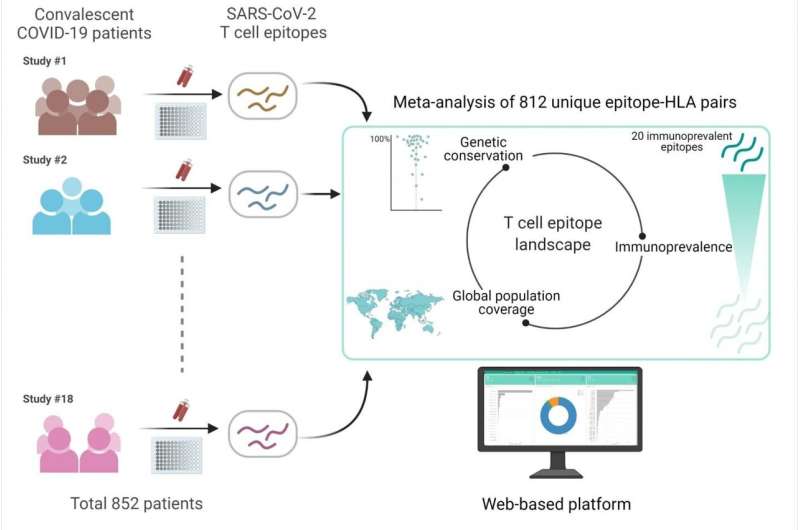Home » Health News » Meta-analysis shows SARS-CoV-2 variants unlikely to affect T cell responses
Meta-analysis shows SARS-CoV-2 variants unlikely to affect T cell responses

In a new study, scientists at The Hong Kong University of Science and Technology (HKUST) have revealed that most T cell epitopes known to be targeted upon natural infection are seemingly unaffected by current SARS-CoV-2 variants.
In their latest research, the team compiled and analyzed data from 18 immunological studies of T cell responses involving over 850 recovered COVID-19 patients from across four continents who are well-distributed in age, gender, disease severity and blood collection time. They demonstrated that T cells in these patients targeted fragments (epitopes) of almost all of the virus’ proteins, including the spike protein that is a main target of many existing vaccines. As an important finding, based on analysis of over 850,000 SARS-CoV-2 genetic sequences from around the world, most of these epitopes appeared to be unaffected by the current variants of concern.
“We focused specifically on recovered COVID-19 patients as their immune responses are representative of effective responses against the virus,” said Prof. Ahmed Abdul Quadeer, Research Assistant Professor from the Department of Electronic and Computer Engineering, who is the first author of the research.
“We believe this is good news, particularly for vaccines. In contrast to antibody responses which have been shown to be affected by variants, our analysis would suggest T cell responses may be relatively robust, assuming that vaccine responses mimic those of natural infection,” said Prof. Matthew McKay from the Departments of Electronic and Computer Engineering and Chemical and Biological Engineering, who co-led the research.
While revealing more than 700 T cell epitopes, the team’s analysis identified 20 specific epitopes—which they refer to as immunoprevalent—that induced T cell responses in multiple independent cohorts and in a large fraction of tested patients. Of these, five appeared highly immunoprevalent, registering T cell responses in at least four separate immunological studies.
“The identified immunoprevalent epitopes appear to represent parts of the virus that are commonly targeted by T cells in recovered COVID-19 patients,” added Prof. McKay. “It is possible, but subject to further experimental investigation, that targeting these epitopes may play a role in contributing to favorable disease outcomes.”
The compiled data has been integrated into a web platform, which the team plans to keep updated as more immunological studies of SARS-CoV-2 T cell epitopes are reported.
Source: Read Full Article
-
 Diet study recommends hazelnut as a natural dietary Supplement
Dec 15, 2018
Diet study recommends hazelnut as a natural dietary Supplement
Dec 15, 2018 -
 Positive metabolic effects of gastric bypass found to disappear quickly
Aug 17, 2023
Positive metabolic effects of gastric bypass found to disappear quickly
Aug 17, 2023 -
 Mental health of older adults significantly impacted by COVID-19 pandemic
Nov 26, 2021
Mental health of older adults significantly impacted by COVID-19 pandemic
Nov 26, 2021 -
 Menopause: HRT’s brain-protecting effect may be overstated
May 11, 2022
Menopause: HRT’s brain-protecting effect may be overstated
May 11, 2022